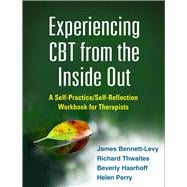Engaging and authoritative, this unique workbook enables therapists and students to build technical savvy in contemporary CBT interventions while deepening their self-awareness and therapeutic relationship skills. Self-practice/self-reflection (SP/SR), an evidence-based training strategy, is presented in 12 carefully sequenced modules. Therapists are guided to enhance their skills by identifying, formulating, and addressing a professional or personal problem using CBT, and reflecting on the experience. The book's large-size format makes it easy to use the 34 reproducible worksheets and forms. Purchasers also get access to a Web page where they can download and print the reproducible materials.
See also Doing CBT, Second Edition, by David F. Tolin, which lucidly explains the full range of CBT techniques, and The Therapeutic Relationship in Cognitive-Behavioral Therapy, by Nikolaos Kazantzis, Frank M. Dattilio, and Keith S. Dobson, which provides key recommendations for optimizing outcomes.








